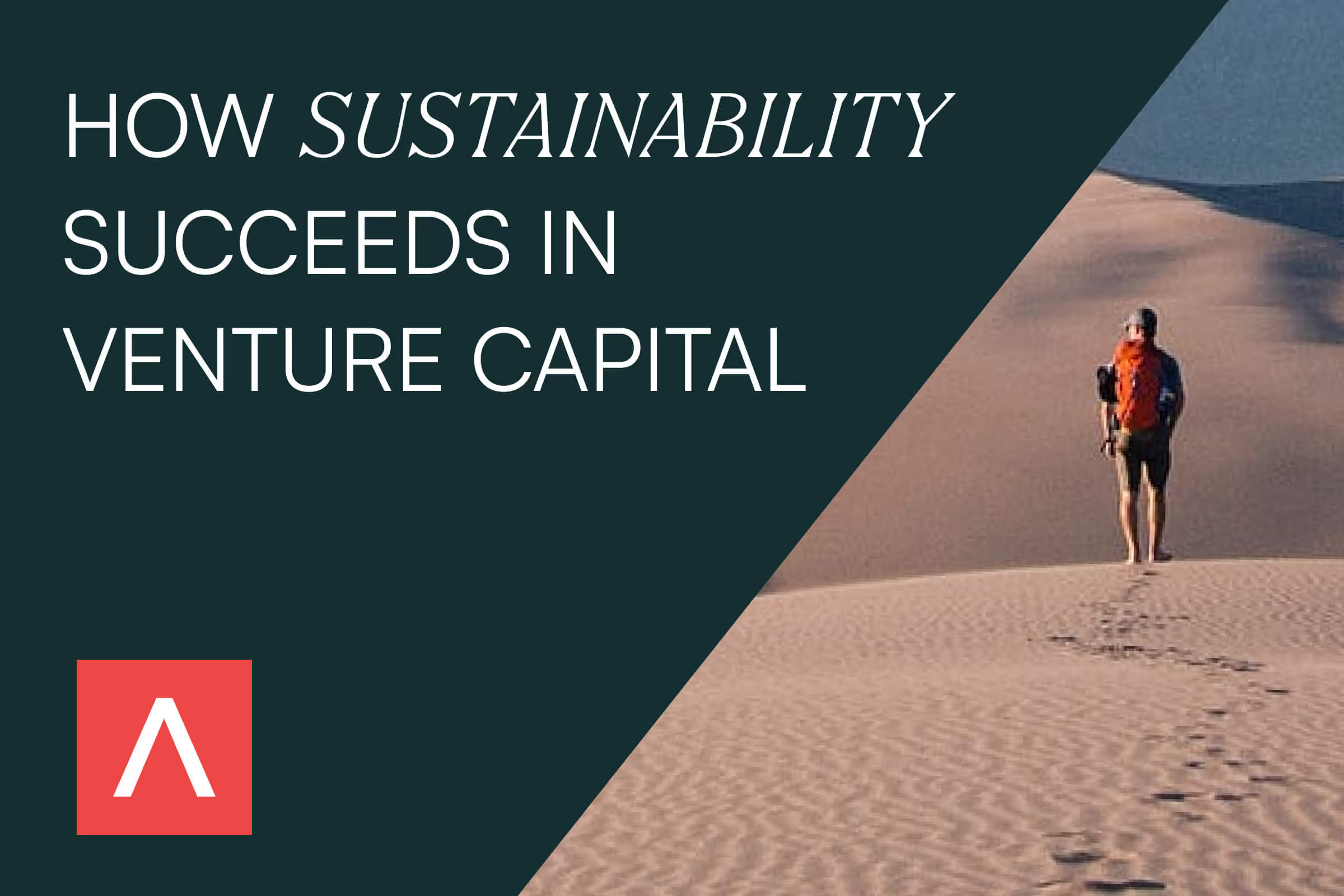1. Different climate tech solutions require different funding models—not everything is a “VC play.”
The global market is ripe for change and there is room for real financial value to be generated by the energy transition. Our panelists discussed how profits are most viable for traditional and impact investors if the right parameters are in place. For example, financial criteria (exit viability), impact metrics, and sector specificity each come into play for a VC to generate returns that meet an LP's appetite. In this context, business models focused on innovation or infrastructure may have a better chance of generating financial outperformance than a product focused on injustice.
While our panelists’ views on climate upside differed based on investor risk appetite, they were in agreement on climate downside. The potential for negative impacts caused by the energy transition should be consistently baked into every VC’s strategy, even if they are not impact focused.
While capital has funneled quickly into climate tech, all panelists agreed there is still a desperate need for more investment into the space from all angles.
“When we don’t make profits as a startup we are a charity, and that’s not sustainable also for our economy. We need an economic shift.” —David Oudsandji
“There is injustice, infrastructure, and innovation within climate tech. Injustice is really hard to fix, infrastructure is tricky to monetize but some capitalistic models do exist. The last one, innovation, is in a sector where venture capital plays at its best. So, it really depends on the idea. But if people are going to make a profit and slowly chip away from the purpose of the company, turning into a greenwashing company, then we have completely failed.” —Hampus Jakobsson
“I don’t think climate tech will be separated in the future from traditional—web-based, for example—tech.” —Lukky Ahmed
2. The downstream impacts of climate change are expected to shift systems and prices dramatically.
Our panelists discussed how climate tech startups—particularly in deep tech, where the largest investment gap exists today—may take time to achieve scale and price competitiveness. However, as prices shift in certain sectors, the green premium can and should become less and less relevant.
Of course, a company that can prove cost parity is likely to have easier access to investment capital. That being said, investors like Pale Blue Dot and AENU have more appetite for a price premium than many might expect. Themes of social consciousness and the desire to work with businesses to manage the transition effectively are also driving investments today.
At the same time, our VC and startup panelists shared conviction in a solution that would properly measure sustainability in monetary terms. For example, in a world with taxes on CO2 and greater subsidies in grants / non-dilutive capital, the green premium would not be borne by commercial entrepreneurs, their products, and their investors. Instead, the price points of more “planet destructive” products would increase relative to impact-aware ones. These changes will be important to create greater access for consumers who seek sustainable products, but cannot pay an above-average price in the short term.
“If you think about good quality stuff, you’ll be willing to pay for that. There’s a social consciousness that exists across consumers today.” —Lukky Ahmed
“Today, we’re spending an immense amount of capital subsidizing businesses which destroy our planet.” —Hampus Jakobsson
“We don’t want to invest in a company or technology that will always have some sort of premium above the traditional, because only a certain percent of the population who is privileged will be able to use it.” —Melina Sanchez
3. Investors need to adjust their time horizons to reflect the realities of deeptech.
When we talk about climate tech, most enthusiasts agree that this innovation has a role to play in solving one of the world’s most sizable problems (if not the largest ones). But typically innovation is not broken down into software and hardware. While work needs to be done across the spectrum, most of the work funded by traditional VC is in the software bucket. We asked our panelists why.
The time horizon for hardware solutions is not five, seven, or 10 years, and investor appetites need to adjust for this as climate is not something that will be solved in that period. Deeptech is a lucrative investment but requires fund structures and companies to shift their business expectations and time horizons in order to succeed.
Voltfang’s David Oudsandji asked for flexibility when investing in the more complex areas of deeptech. Hampus Jakobsson suggested there is a multi-billion-dollar opportunity for late-stage investors that needs to be grasped. If enough VCs can understand the challenges faced by R&D within deeptech, what were once considered risks may become tangible considerations to be aware of. The appropriate hiring and timing decisions can then funnel capital into a lucrative space that sorely needs it.
“Climate is a way bigger thing than web…no investor today would say no to a web investment. It’s not going to be a theme, there are going to be opportunities in super early stages, in venture, in growth. People are deploying a lot of money into this on very sensible things.” —Hampus Jakobsson
“Everything can be done if enough people believe, and enough capital exists. We hope that the VCs understand which challenges we face and the timing that we need for R&D. It’s different from software. There are more delays, things like this aren’t common in software but in hardware they are there every day. This needs to be understood.” —David Oudsandji
4. Bubbles come and go but climate tech is the biggest project humanity has ever taken on.
We asked our panelists why the previous climate tech bubble occurred, and what has changed since. At the time, venture funds were pumping capital into areas of the “then” climate tech market, like commodities and newly cheap forms of natural gas, without realistic time horizons for returns. Meanwhile, the 2008 financial collapse was putting pressure on funds to generate returns without the appropriate capex spend. Panelists believe investors have learned from past mistakes and shifted growth expectations to be more realistic than in the past. The market has seen a multitude of high-value innovations, while sectorwide regulation has created a new standard for climate tech.
While the investible market has grown, our panelists admitted it has not been smooth sailing. There will always be a recalibration in market dynamics that needs to happen, and the same holds true in climate tech. Regardless, the panel agreed that there is still a significant need for more investment into the space across the board.
“With market dynamics everyone is being careful about flying to quality and making sure not to deploy capital that you have fast and sometimes dirty. So, thinking about quality has been our priority over the last few months. I do think there are enough sectors within climate. ” —Melina Sanchez
“We’re always feeling anxious that we’re investing too slow…One of the reasons we had the cleantech bubble was that VC invested in commodities, which has no overlap with climate tech. It’s a massive fear that we have a climate bubble, but at the same time we have a massive quick commerce or scooter bubble. We see amazing quality, we’re not changing our view irrespective.” —Hampus Jakobsson
As a global investor, Antler is dedicated to moving the world forward by investing in the defining companies of the coming decades. We believe that technology products building for the energy transition will play a massive role in driving value creation for investors, and for all of society.
By integrating ESG and impact into our investment decisions and partnering with founders from inception, we lay the groundwork for building sustainable and resilient businesses addressing some of the most pressing challenges of our time—balancing impact and profit. Read our report on how VC firms might better articulate an approach to ESG considerations and impact.
If you are building a climate tech company or passionate about the topic, please email esgandimpact@antler.co or Trisha Nangia, Youri Doeleman, and Ronald Jan Schuurs on our Amsterdam team. We would love to hear from you, learn from you, and build with you.




.avif)






